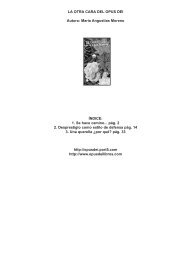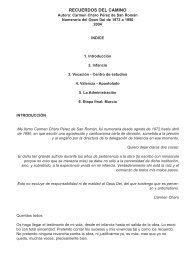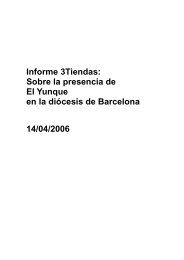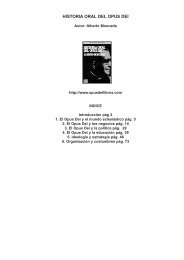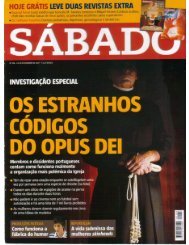You also want an ePaper? Increase the reach of your titles
YUMPU automatically turns print PDFs into web optimized ePapers that Google loves.
the possibility of having some extraordinary Confessor even when they were in great need of such aConfessor to receive counsel about their own conscience. Finally, it was introduced as a norm of goodjudgment and prudence that Superiors would properly guide their subjects according to rule aboutspecific penances and other acts of piety. But this norm was abusively extended to the extreme thatSuperiors at their whim were the ones allowing, or sometimes absolutely forbidding, the reception ofHoly Communion.From this it resulted that [506] these types of dispositions, which were wisely established at thetime with the purpose of promoting in a healthy way the spiritual advancement of beginners and ofsafeguarding the peace and harmony in the unity of Communities, often ended up becoming a cause ofdiscriminating against souls, creating anguish in consciences, and even upsetting the external peace, asit is most clearly shown by the appeals and protests presented at various times before the Holy See.Therefore, Our Most Holy Lord Leo, Pope XIII by divine providence, with solicitude for what ismost suitable for this most beloved part of his fold, in the Audience held the 14 of December of 1890 todeal with consultations and issues with me, the Cardinal Prefect of the Sacred Congregation of Bishopsand Regulars, after examining all of them with extreme care and diligence, decided, commanded anddecreed with special solicitude the following:I. His Holiness cancels, abrogates, and from now on declares null and void any dispositions in theConstitutions of Pious Unions, of Institutes of women, of either simple or solemn vows, and even oflay persons of any kind, 28 even if they were to have received the approval of the Holy See in any form,even that usually called most special, on this matter, namely, in whatever regulates, calling it by thisname or in any other way, the intimate manifestation of the conscience and the heart. Therefore, forthis reason, the male or female Directors of these Institutes, Congregations and Societies, are imposedthe grave charge of suppressing absolutely the above-mentioned dispositions, suppressing them entirelyfrom their own Constitutions, Directories or Manuals. He likewise cancels and suppresses any uses orcustoms on this matter even those from time immemorial.II. Furthermore, the above-mentioned male or female Superiors of any rank or preeminence arerigorously forbidden to directly or indirectly induce their subjects, by precept, advice, fear, threats, orpraise, [507] to render to them a manifestation of conscience of this kind. Correspondingly, subjectsare commanded to report to their higher Superiors the abuses of any lower Superiors who would dareto induce them to such behavior. And if those responsible for such inducement were to be the male orfemale General Director, [they are then commanded] to report such abuses to this Sacred Congregation.III. This in no way precludes the possibility for subjects to freely and spontaneously open theirsouls to their Superiors to receive prudent guidance and advice, in their doubts and anxieties, toacquire virtues and to advance in the path of perfection.IV. In addition, while upholding —as regards ordinary and extraordinary Confessors of Communities—what was prescribed by the Holy Council of Trent in its Session 25, Chapter 10, “de Regularibus,” andeverything established by the great Master Benedict XIV in the Constitution “Pastoralis curae,” HisHoliness admonishes Prelates and Superiors not to deny their subjects an extraordinary Confessorwhenever they were to request it, to seek advice for their conscience. But in such a way that thesesuperiors will in no way inquire about the reason for this petition, nor will it be explained to them thereason why the petition is made. And to avoid that this prudent disposition would be frustrated, heexhorts the Ordinaries to designate competent priests having licenses in those places of their Diocesewhere there are Communities of Women, so that they will easily be able to go to receive the Sacramentof Penance.V. As regards the authorization or prohibition of receiving Holy Communion, His Holiness decidesthat permissions or prohibitions of this kind should be the exclusive competence of the ordinary or28 Translator’s Note: Note that the Decree includes the spiritual direction of lay people. The CIC-83 has canonsforbidding the manifestation of conscience to Superiors in the two cases that the legislator could envision: Superiors ofreligious, and Superiors of seminaries. That the same problem could arise for lay people was unimaginable. In <strong>Opus</strong> <strong>Dei</strong>this has been used as a loophole to give verbal assurances that canon 630 does not apply to the Prelature, since it isonly for religious. The canons forbidding the manifestation of conscience in seminaries do directly apply to the Superiorsof Centers of Studies of the Prelature. And the Quemadmodum decree itself does indeed apply to lay people as its textmakes clear. The objection is absurd, since all these canons, as well as the Quemadmodum decree, are all based on thesame universal moral principle: the absolute respect due to the conscience of every human being. In connection withthis whole matter it is worth pointing out that —in Number 1 of the Section on Espíritu (Spirit) of the secret 1941Statutes of <strong>Opus</strong> <strong>Dei</strong> mentioned in footnote 23— Escrivá mentions as a perpetual and irreformable feature that: “lossocios del <strong>Opus</strong> <strong>Dei</strong> no son religiosos, pero tienen un modo de vivir —entregados a Jesús Cristo— que, en lo esencial,no es distinto de la vida religiosa” (<strong>Opus</strong> <strong>Dei</strong> members are not religious, but they have a way of life —dedicated to JesusChrist— that, in what is essential, does not differ from the religious life).17


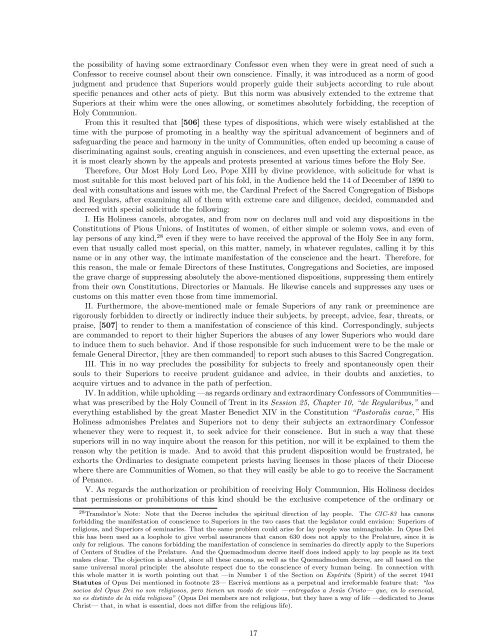
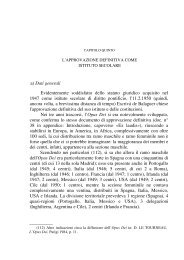
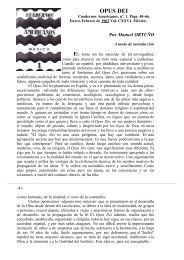
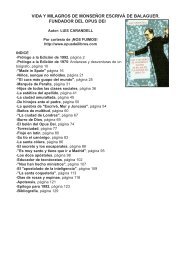
![Opus Dei Anexo A Una Historia [pdf].](https://img.yumpu.com/14295645/1/184x260/opus-dei-anexo-a-una-historia-pdf.jpg?quality=85)
